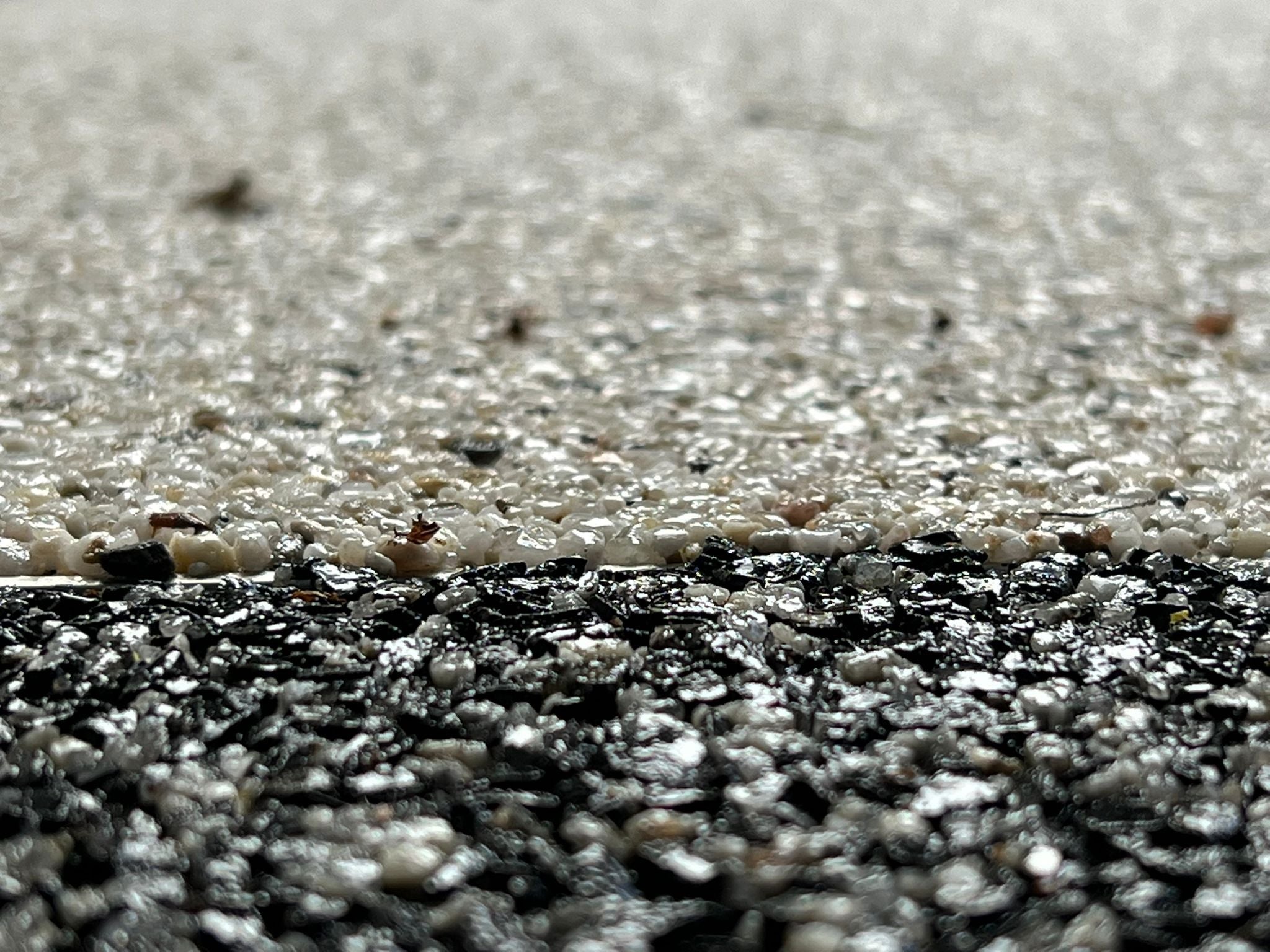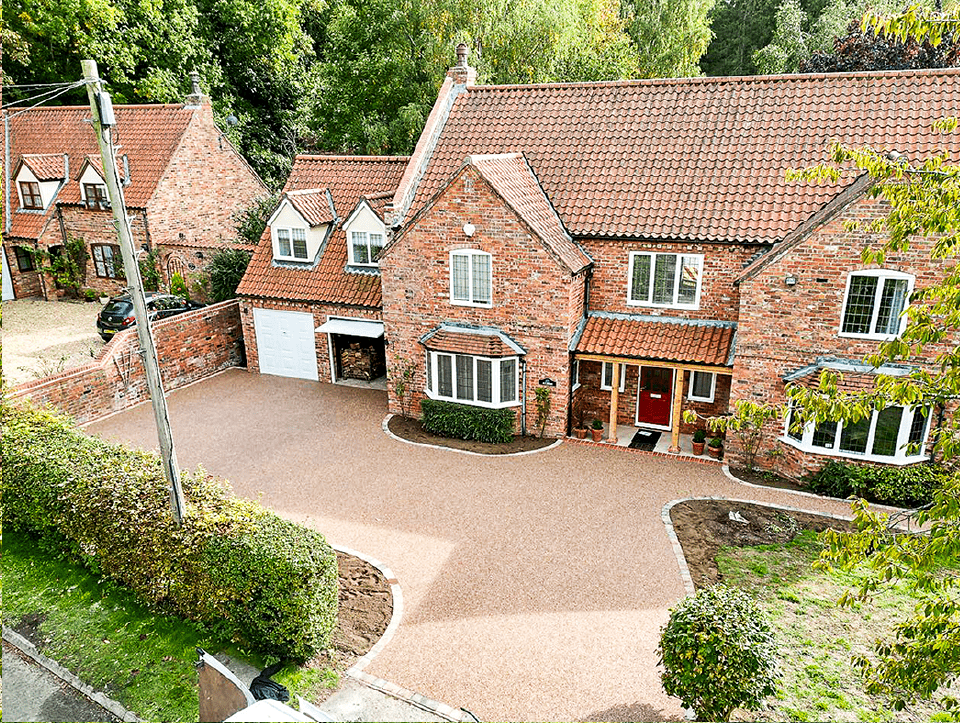Resin bound and resin bonded surfacing may sound very similar, but they are quite different in how they’re made and what they deliver. Both systems have been increasingly popular choices for homeowners for outdoor surfacing needs.
Though both combine resin with aggregate, their application, durability, drainage, appearance, and maintenance needs vary.
Choosing the right type depends on your priorities: whether it's the look and feel, longevity, drainage, safety, cost, and or style of your property.
Resin bound produces a smooth, fully permeable surface where every stone is bound together, making it durable and long-lasting. In contrast, resin bonded creates a textured finish where the stones sit on top of the resin, offering excellent grip but less strength and drainage capability.
Understanding these differences is key to choosing the right option for your project.
This post explains what each system is, how they differ, and which option might be best for different project needs.
|
Benefit |
Resin Bound |
Resin Bonded |
|
Permeable / SuDs Compliant |
✔ |
❌ |
|
UV Stable Colours |
✔ |
✔ |
|
Slip Resistant |
✔ |
✔ |
|
Weed Resistant |
✔ |
✔ |
|
Low Maintenance |
✔ |
❌ |
|
Seamless Finished Surface |
✔ |
❌ |
|
Frost Resistant |
✔ |
❌ |
|
Long Life |
✔ |
❌ |
|
Low Cost |
❌ |
✔ |
How does a resin bound system work?
A resin bound driveway is created by mixing dried aggregates (gravel, crushed stone, quartz, marble, etc.) with a two-part polyurethane resin kit.
The resin is available in both a UV and non-UV format. Using UV resin will protect the surface from discolouration, whereas the slightly cheaper non-UV option can lead to colour change within the surface. The industry advises always choosing a UV option where possible, unless you want to achieve the colour change.
The mixture is then laid over a solid prepared base, often permeable concrete or tarmac and trowelled or floated to produce a smooth, even surface.
Typical mix ratios and depths
- The correct mix ratio is 4 bags of washed and dried aggregates to 1 resin kit. For example, a typical mix would be made up of 1-5mm aggregate, which is available in both pre-mixed (Resin Rox) and unmixed units, where different single aggregate colours are combined and mixed on site to create the colour blend.
- Depth depends on use: for pedestrian paths or patios, 15mm may suffice; for driveways with vehicles, 18mm or more is recommended. Heavier traffic areas may need 20mm or above.
Key properties of resin bound systems
- Permeability: Resin bound surfaces are fully permeable, allowing water to drain through, making them compliant with Sustainable Urban Drainage System (SuDS) regulations in the UK.
- Smooth finish: Because the aggregate is trowelled & levelled, there are no loose stones on the surface.
- Durability and maintenance: These surfaces are durable, resist weed growth, require minimal upkeep (occasional sweeping or power-washing), and are suitable for vehicle traffic.
- Longevity: Resin bound surfaces can last for 20-25 years with proper installation and care.

Why choose Resin Bound Pro from Resin Mill?
Professional installers often turn to Resin Mill because of the reliability and consistency of our products. Pre-blended resin bound aggregates, such as Resin Rox, save time on site and ensure a uniform colour mix every time.
Resin Mill also supplies high-quality UV-stable resins that reduce the risk of discolouration, giving customers confidence in long-lasting results. With nationwide delivery, in-house training, and ongoing technical support, installers know they’re getting not just materials, but a full service designed to make projects smoother and more profitable.

How does a resin bonded system work?
Resin bonded is a surfacing method that begins with priming a solid, non-porous base such as concrete or tarmac. Once the primer is applied, a layer of resin is spread evenly over the surface, and loose aggregate is scattered across it by hand.
The resin bonds the underside of the stones while leaving much of the aggregate exposed, creating a rough, slip-resistant texture. After curing, any excess stone is brushed away. Because the stones are not fully encapsulated, resin bonded is best suited for pathways or decorative areas rather than driveways that need to withstand vehicle loads.
Typical stone sizes and finish
- Aggregate sizes tend to be smaller than with resin bound systems, e.g. 1-3mm.
- The finish is textured and rough rather than smooth, since the stones are exposed.
Typical mix and ratio
Bonded varies from bound when it comes to a mix ratio, as it uses large kits of resin. Typically, you will use a 20kg two-part resin kit combined with 4 bags of 1-3mm aggregate. This will cover approximately 10 square metres. Pre-mixed aggregate options are not available for resin bonded.
Key properties of resin bonded systems
- Non-permeable surface: Because the resin forms a solid layer under the aggregate and the stone is mainly on top, water does not drain through. This can lead to pooling and a need for extra drainage or soakaways. Such systems are generally not SuDS compliant.
- Grip/slip resistance: The exposed aggregate gives more texture and grip, so resin bonded may be preferred in areas needing strong anti-slip properties.
- Maintenance and longevity: Because stones are not fully fixed, there is potential for stone migration, loosening over time, or greater maintenance to reapply resin or replace lost aggregate.
Why choose Resin Bonded Pro
Installers often select Resin Bonded Pro from Resin Mill because it’s been developed for ease of use, reliable coverage, and consistent performance.
Each 20kg kit is formulated to work seamlessly with the right aggregate quantities, giving a predictable finish across projects.
Backed by Resin Mill’s training and technical support, installers can deliver a quality surface with confidence, whether the job is a decorative pathway or a large-scale landscaping project.
Resin bound vs resin bonded pricing
One of the most noticeable differences between resin bound and resin bonded systems is the overall cost per square metre.
- Resin Bonded: Because bonded surfaces use less resin and are laid at a shallower depth, prices are generally lower than with resin bound. Installation costs often fall in the region of £60-£100 per m², depending on the size of the area and site preparation.
- Resin Bound: Bound surfaces require more resin, greater aggregate volume, and more skilled installation. Costs are usually higher than resin bonded, typically £120 - £160 per m². However, this added investment translates to better durability, drainage compliance, and a longer-lasting surface.
While resin bonded can look attractive for lower upfront costs, installers and property owners need to weigh that against the long-term benefits of resin bound systems.
Which is the best system?
If your project requires a durable driveway surface that can handle vehicles, resist wear, and comply with SuDS drainage regulations, resin bound is the clear winner. Its smooth finish, permeable structure, and low maintenance demands make it the best choice for most residential and commercial driveways.
That said, resin bonded still has its place. If you’re looking for a decorative pathway or feature area that needs a rustic, textured finish with strong anti-slip properties, bonded can be an effective and affordable option. It’s particularly popular for lighter-use spaces where vehicle traffic isn’t a concern.
Key takeaways
Choose resin bound if you want a smooth, permeable, long-lasting solution compliant with SuDS that's ideal for driveways and heavy-use areas. Choose resin bonded if you want a textured, cost-effective solution for decorative projects.
Note that both systems require a stable and sound base for installation to ensure durability.
If you’re unsure which system is right for your project, contact Resin Mill for tailored advice.
Installers can also join one of our training courses to fully understand the differences between resin bound and resin bonded systems and gain the confidence to deliver both.
FAQs
What are the main differences between resin bound and resin bonded surfaces?
Resin bound is a fully mixed system where the aggregate and resin are combined before laying, creating a smooth, strong, permeable finish with no loose stones. Resin bonded is applied differently; the resin is spread onto the base, and a fine aggregate is scattered on top. This produces a textured, gravel-like appearance that isn’t permeable and may shed stones over time. Because of this, resin bound is more durable and suitable for driveways, while resin bonded suits decorative or light-use areas.
Which system is more suitable for a driveway or vehicle-use area?
For any driveway or area that will take vehicle traffic, resin bound is the recommended choice. Its fully bound structure gives strength, stability and long-term performance under load, while resin bonded’s loose-stone texture and non-permeable finish make it more prone to stone loss, wear and drainage issues when used for driveways.
What are the pros and cons of resin bonded? Does it ever make sense instead of resin bound?
Resin bonded can be ideal for paths, patios or heritage areas because it’s cost-effective, quick to install and offers a traditional gravel look with excellent grip. However, it’s non-permeable and can shed stones over time, so it’s not suitable for driveways or heavy-use areas. It works well for decorative or lightly trafficked spaces, but resin bound provides better long-term durability for most projects.
How do drainage and weather performance compare between resin bound and resin bonded?
Resin bound is fully permeable, allowing water to drain through the surface, meeting SuDS requirements, which helps prevent puddling and surface-water runoff. Resin bonded is not permeable, meaning water will sit on the surface unless additional drainage is installed, making resin bound the more robust option in wetter climates or areas where drainage is a priority.
How do maintenance and long-term durability compare between the two systems?
Resin bound surfaces are low-maintenance and long-lasting because the stones are fully bound, preventing loose gravel and reducing weed growth or debris build-up. Resin bonded surfaces can require more upkeep, as loose stones, wear and surface degradation may occur over time. For a surface that stays cleaner and performs better in the long term, resin bound is the more reliable solution.
More about the Author here: Lee Pearson








Leave a comment
This site is protected by hCaptcha and the hCaptcha Privacy Policy and Terms of Service apply.